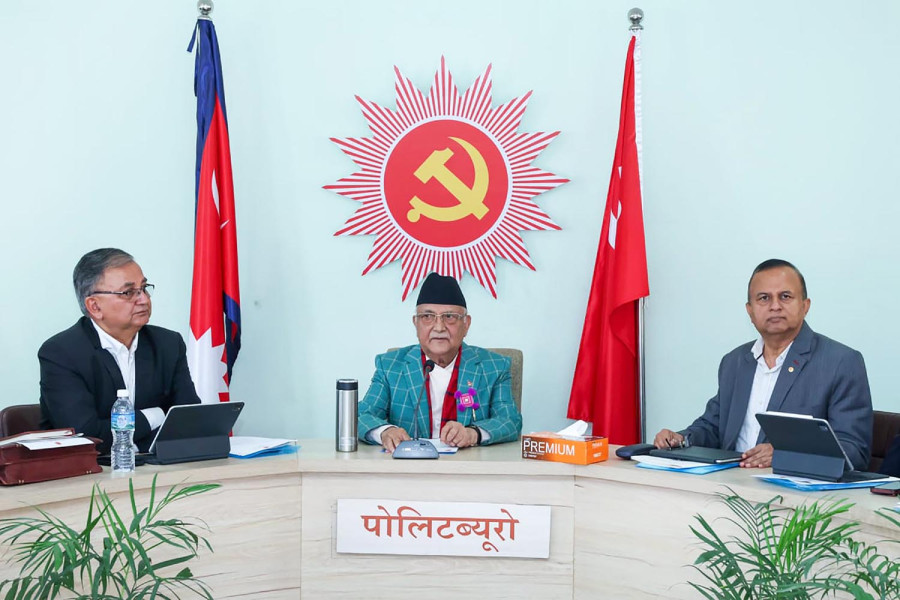Politics
CPN-UML shuts door on leftist unity
Leaders cite existing partnership with Congress and lessons from past left alliances as reasons to avoid electoral alliances.
Anil Giri
The CPN-UML, Nepal’s largest communist party, has apparently forestalled unity among leftist parties. Concluding its two-day politburo meeting on Wednesday, the ruling party has decided against forging electoral alliances with other communist forces.
During the meeting of the high-ranking decision-making body, some UML leaders had questioned the potential for unity with leftist parties like the CPN (Maoist Centre) in the upcoming elections. However, KP Sharma Oli, the party chairman and prime minister, dismissed the possibility, saying, “As the Nepali Congress has decided to contest the upcoming elections on its own, it is time for us to do the same and go to the elections independently.”
The Nepali Congress and the UML have been archrivals in Nepali politics since the restoration of democracy in 1990. Despite this, they have also formed several governments together in the past, even while competing fiercely during elections and in leading the country.
With the rise of new political forces and a strong rival like the Congress, some UML leaders had expressed concern that the party could face a serious threat in the upcoming elections. They suggested forging alliances with other communist parties or forming a “leftist” bloc ahead of the general and provincial elections scheduled for 2027.
However, Chairman Oli dismissed the idea, saying, “There is no need to form such alliances, fronts, or unity among leftist parties. We don’t need such unity.”
According to Rajendra Gautam, head of the party's publicity department, some leaders were curious about the possibility of a leftist alliance in the upcoming elections.
However, Oli, citing the Nepali Congress’ decision to contest the elections solo, reiterated that unity among leftist parties is neither possible nor necessary, according to leaders.
In 2017, the UML had forged an alliance with the Maoist Centre and contested the elections under the banner of a broader leftist unity. The alliance yielded strong results, securing a majority of seats, but it fell apart by mid-2021.
According to a UML politburo member, there are several reasons behind the party’s decision not to pursue a similar alliance this time.
“First, the UML is currently leading the incumbent government with the support of Nepali Congress. Second, there is a good trust between Oli and Congress chief Sher Bahadur Deuba. Since the two parties came together to form a government based on a seven-point agreement, it wouldn’t be a wise move to antagonise the Congress by forming alliance with other parties,” the member explained.
“Third, the Congress’ decision to contest the elections independently prompted us to do the same. And fourth, the widening rift between the UML and the Maoist Centre in recent days also contributed to the decision to go it alone.”
There are also strong voices within the UML that the party should not carry the burden of the Maoists into the upcoming elections, said the politburo member, adding, “We have already learned a lesson from our past decision to unite the party with the Maoists.
In the politburo meeting, some leaders argued that the old model of left unity did not work. “So if an alliance with leftist parties is necessary, it should focus on unity with party cadres and supporters, rather than the leadership,” said Bishal Bhattarai, another member of the UML politburo.
“We have a very painful history of failed unity among the left parties,” Bhattari added. “Therefore, we now have to opt for the new model where serious discussion and deliberation on ideology, organisation, and other critical issues would be discussed before forging any alliances.”
He said the past unity between the UML and the Maoist Centre left a bad impression on the public. “Next time, if we consider leftist unity, we have to be careful, and engage in detailed discussions and deliberation,” said Bhattarai.
The meeting also decided to give continuity to the partnership with the Nepali Congress and oppose any efforts at leftist unity. Also, the party has vowed to address growing issues of indiscipline and disorderly activities, so that the party could emerge as a strong national force in the 2027 elections.
In his address, Oli had reviewed the current political situation, the government’s performance, and outlined future priorities. He urged the party members to work together to make the party’s Mission 2084 [2027 elections] a grand success. The UML has already launched several campaigns targeting the next elections.
A total of 51 politburo members shared their suggestions and feedback during the meeting, where party general secretary Shanker Pokhrel presented a proposal to position the UML as a decisive national force. The meeting also provided several suggestions to improve the government’s functioning.




 13.12°C Kathmandu
13.12°C Kathmandu














